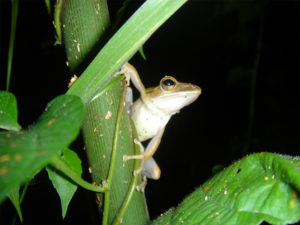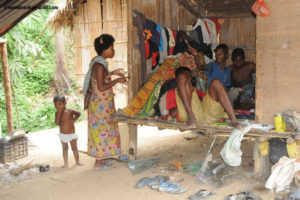The Batek firmly oppose laughter yet they sometimes laugh together anyway, feeling guilty about engaging in the forbidden activity. Their prohibition against laughing is an important part of a complex of beliefs regarding the natural and supernatural agents that surround them in their Malaysian forest homes.

Alice Rudge, an anthropologist who is employed by the University College London as a Junior Research Fellow, has been doing fieldwork among the Batek since 2014. She published a piece about laughter among the Batek in September 2019 that was reviewed in this website on September 12 last year. She amplified her analysis of the implications of their laughter last week in a post on the website Allegra Laboratory, which is devoted to publishing peer-reviewed anthropology papers that fall outside the purview of standard academic publishing.
Rudge opens her discussion with a story of how she and two Batek ladies, sisters, spent an afternoon together making decorations out of leaves. The two ladies asked the visitor to film them singing songs from their younger days since cutting the leaves reminded them of activities they had engaged in as teenagers.
But whenever Na? Srimjam, one of the sisters, reached a particular part of the song, her sister, Naʔ Badək, “would make her laugh by giving her a funny look, and each of us would break down into tears of giggles.” Na? Srimjan would remind the group that laughing was taboo—they needed to stop it. Once they quieted down, the sisters would resume singing until the two looked at one another and burst out laughing again. The situation was made funnier because they all knew their laughter was forbidden by Batek beliefs.

The anthropologist devotes her essay to exploring the ramifications of their belief system. One of the more serious consequences of laughing too much or too loudly, of violating their taboo, is that the laughter might be heard by Gubar, the thunder deity, who might retaliate by attacking the offending village with a devastating thunderstorm. Laughing in different situations, such as in proximity to the smaller forest creatures such as frogs, millipedes, leeches, lice, worms or monitor lizards, is especially forbidden and could arouse the dreaded ire of Gubar.
Rudge suggests that the laughter of the sisters that day was simply too much fun for them to avoid— “subversively pleasurable” she calls it—so they took the risk of sharing the intimate memories. Besides, Gubar is different from human beings so he may not have the same understandings of the meaning of laughter as the women. As the author puts it, “any instance of laughter might be funny to some, but anger-inducing to others.” Relationships with the storm deity, as with human interpersonal relations, can always be misinterpreted. One needs to be careful.
Non-human entities as well as humans fail at their relationships and their interpretations of events. A forest bird called the wãl bird, known for announcing the birth of a human by making its wãl wãl wãl cry, sometimes gets it wrong and no baby has been born. On that day when the anthropologist was present, Gubar failed by not noticing the laughter of the sisters. And sometimes, Gubar’s thunderstorms are not caused by human errors. These things are fraught with ambiguities.

Rudge concludes the first section of her essay by writing that these situational ambiguities can foster friction. The rest of her paragraph is worth quoting verbatim: “Different persons are sensitive to the world in different ways. With laughter in particular–as it often emerges spontaneously and uncontrollably–the friction thus caused becomes part of day-to-day life. Part of being a sentient, intentional person among these multispecies entanglements–whether you are human, non-human animal, plant, or thunder-being–is making mistakes. Just as you may misinterpret others’ actions, your own actions–laughter or other–may in turn be misinterpreted by others. Perhaps, even, to your advantage.”
Thus, an underlying basis of Batek peacefulness could be an understanding of the fluidity of failures and successes, of correct and incorrect behavior, of ambiguity among the intentions of humans, wildlife and deities.